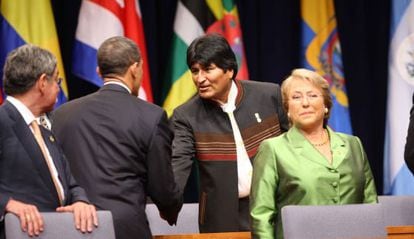Bolivia seeks to improve its international image
President Morales is trying to reset relations with the US to boost lawsuit against Chile


During his second term of office, Bolivian President Evo Morales has had to perform a balancing act to combine his anti-capitalist rhetoric with his efforts to get close to the business sector. Now, as he prepares for his third mandate, which begins early next year, his pragmatism has led him to begin a campaign to reset diplomatic relations with his worst enemy, the United States. Bolivian diplomats are trying to build bridges with Washington in order to improve their country’s image abroad and therefore boost its lawsuit against Chile over access to the Pacific Ocean at the International Court of Justice in The Hague. The diplomatic efforts did not, however, stop Morales from attacking the United States at the Bolivarian Alliance for the Peoples of Our America (ALBA) summit in Havana on Sunday.
On Thursday, Bolivian Foreign Minister David Choquehuanca said his country had proposed a meeting between President Barack Obama and Morales in order to relaunch bilateral relations after La Paz expelled American ambassador Philip Goldberg in September 2008 for allegedly interfering in domestic affairs. The United States responded in kind.
We have proposed a meeting between President Morales and President Obama” Bolivian Foreign Minister David Choquehuanca
Peter Brennan, chargé d’affaires at the US Embassy in La Paz, has been the link between the two sides. “We have had several meetings, and at the last one we proposed organizing a meeting at the highest level. We have proposed a meeting between President Morales and President Obama, with all due respect,” Choquehuanca said.
Soon after the announcement, Marcelo Elío, the president of the Bolivian Chamber of Deputies, said: “We will very probably reinstate ambassadors.”
The American diplomat told local media: “We are happy that the government of Bolivia wants to improve relations with the United States. We have to work on the conditions. I am here to try to establish a relationship based on trust.”
The Bolivian government is also convinced that, after President Dilma Rousseff’s investiture, Brazil will send an ambassador to La Paz after recalling its envoy there in 2013.
We want the International Court to make Chile sit down and negotiate” Carlos D. Mesa, ex-president and Bolivia’s representative in its lawsuit over sea access
Both his cabinet and his party, Movimiento al Socialismo (MAS), have urged Morales to present Bolivia as a serious and solvent nation in order to face the country’s greatest foreign policy challenge: its lawsuit against Chile over access to the sea. Since the investigation began at The Hague in April 2013, La Paz has watched Chilean President Michelle Bachelet meet Obama in June. The American president even joked: “She’s my second favorite Michelle.” Chilean Foreign Minister Heraldo Muñoz has also held talks with US Secretary of State John Kerry.
“A smooth relationship with the United States is indispensable,” said ex-president Carlos D. Mesa (2003-2005) who is representing Bolivia in the lawsuit. Last Friday, Mesa told EL PAÍS that the suit was “not about borders. It’s that Chile is telling the world that Bolivia wants to have a tantrum. And that’s not the way it is. We want the International Court to make Chile sit down and negotiate.” According to Mesa, if Bolivia wins its longed-for access to the sea, the country would enjoy a “significant increase in GDP, absolute freedom to establish strategic import and export relations and, most importantly, a full presence on the Pacific, which is indispensable. The future of the global economy is there.”
Ex-president Eduardo Rodriguez Veltzé (2005-2006) joined Mesa in the suit. Both were once critical of Morales’ administration, but Mesa said he nonetheless accepted the mission because, for him, the suit represents “an unusual vision of the state, not of President Morales, but of Bolivian politics in general.”











































